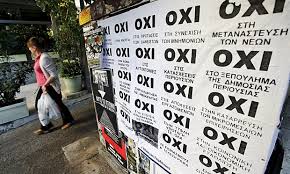More than 61 percent of Greek voters on Sunday rejected fresh austerity demands by the country’s EU-IMF creditors in an unprecedented referendum.
 More than 61 percent of Greek voters on Sunday rejected fresh austerity demands by the country's EU-IMF creditors in an unprecedented referendum.
More than 61 percent of Greek voters on Sunday rejected fresh austerity demands by the country's EU-IMF creditors in an unprecedented referendum.
Thousands of Athenians gathered in central Syntagma Square to celebrate the result, despite warnings that failure to reach a deal with the creditors could trigger a Greek exit from the eurozone.
"Together we have written a bright page in modern European history," Prime Minister Alexis Tsipras told the nation in a televised address.
"This is not a mandate of rupture with Europe, but a mandate that bolsters our negotiating strength to achieve a viable deal," he added.
The head of the Eurogroup of eurozone finance ministers, Jeroen Dijsselbloem, called the Greek 'No' result "very regrettable for the future of Greece".
European Commission president Jean-Claude Juncker had said a Greek 'No' would be "no to Europe".
However, the European Commission announced in a statement Sunday that it "respects" the result of the Greece bailout referendum after Greek voters overwhelmingly rejected terms offered by international creditors.
Commission president Jean-Claude Juncker will hold a teleconference on Monday morning with European Central Bank chief Mario Draghi and Jeroen Dijsselbloem, the head of the Eurogroup of eurozone finance ministers, the statement added.
Juncker will also be "consulting tonight and tomorrow with the democratically elected leaders of the other 18 eurozone members as well as with the heads of the EU institutions," it added.
"The European Commission takes note of and respects the result of the referendum in Greece," the statement said.